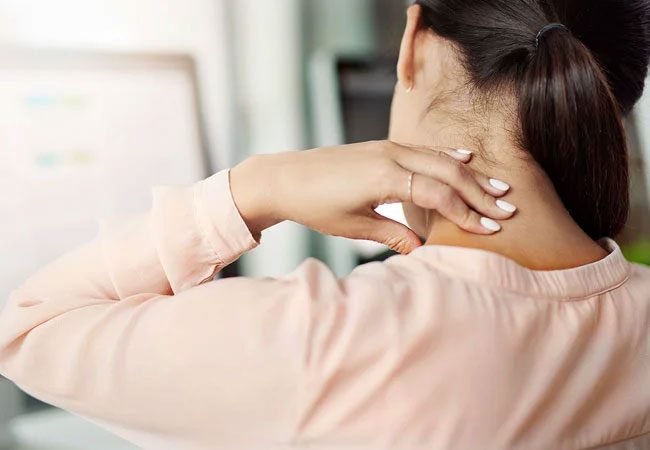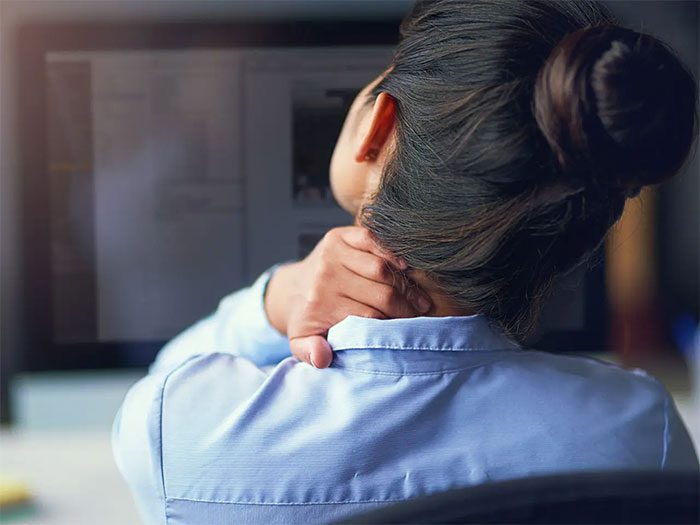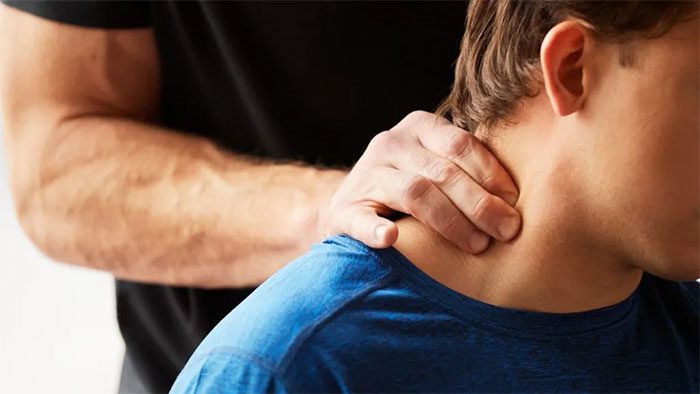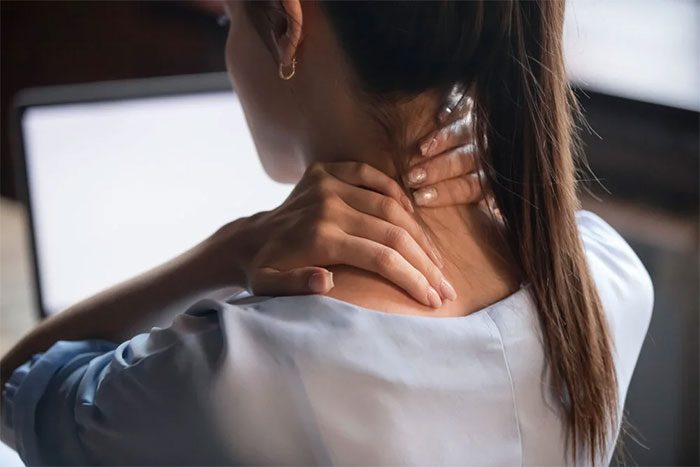Stiff neck often occurs when one of the neck muscles is strained, commonly during cold seasons or when lying in one position for an extended period.
If neck stiffness is due to muscle strain, you can manage the symptoms at home. However, in rare cases, neck stiffness can signal a dangerous condition that requires medical attention.
What You Need to Know About Stiff Neck
1. What is a stiff neck?
Here are some causes of neck stiffness you might consider:
1.1. Sprain
Neck stiffness is often the result of a mild injury or muscle strain due to:
- Sleeping in an awkward position
- Sitting or bending your head for long periods, such as working at a desk with a computer
- Bending down to look at something specific, such as a phone for an extended time
- Injury while playing sports
- Falling
- Body tension due to stress.
1.2. Whiplash
More severe neck injuries can cause whiplash, which occurs when the head is suddenly moved in one direction and then quickly snapped back. This motion can damage the neck.
Whiplash can occur in a car accident. Neck stiffness is the most common symptom of whiplash.

There are many causes of neck stiffness. (Image: Internet).
Other symptoms of whiplash include:
- Headaches
- Dizziness
- Back or shoulder pain
- Tingling or burning sensations in the neck area
- Memory loss or difficulty concentrating.
1.3. Arthritis
Cervical spondylitis, also known as cervical arthritis, can also cause neck stiffness, which may alleviate when lying down.
The pain can worsen if a person maintains the same position for too long, such as when driving or sitting in front of a computer. Other symptoms of cervical arthritis include:
- Headaches
- Numbness in the arms or hands
- Difficulty walking, balance issues, or both
- Weakness in the arms or legs
Doctors can diagnose cervical arthritis with certain tests, such as X-rays, MRIs, and blood tests.
1.4. Meningitis
Sometimes, neck stiffness is a symptom of meningitis—a serious condition that requires medical treatment. Meningitis is the inflammation of the meninges, the protective layers of the brain and spinal cord.
Viruses, bacteria, or fungi can cause meningitis. Viral meningitis may resolve on its own, but bacterial and fungal meningitis can threaten the life of the infected person. Some symptoms of meningitis include:
- Sudden fever, often accompanied by headaches, neck stiffness, or both
- Nausea
- Vomiting
- Light sensitivity
- Confusion, irritability, or both
- Fainting, difficulty waking up.
If these symptoms occur, contact a medical facility promptly for early care.

Neck stiffness due to meningitis requires medical care. (Image: Internet).
1.5. Is neck stiffness a sign of a stroke?
It is rare for a person experiencing a stroke to develop neck stiffness (about 1%). A stroke is typically associated with other symptoms such as facial drooping, weakness or numbness on one side of the body, difficulty speaking or understanding language, sudden severe headaches, vision loss, or difficulty moving and maintaining balance.
However, if you experience unusual or severe symptoms, you should seek emergency medical care.
2. How to relieve neck stiffness
The treatment for neck stiffness can vary depending on the cause. Here are some ways to alleviate neck stiffness that you should know:
2.1. Ice pack
Using an ice pack can help reduce inflammation and swelling after a mild injury causing neck stiffness. Cold can have a numbing effect, temporarily relieving pain.
This treatment is usually most effective within the first 48 hours after an injury when the injured area tends to swell the most. Apply ice to the injured area through a cloth/bag and for a maximum of 20 minutes at a time, then rest for 20-30 minutes. This can be repeated if swelling and pain persist.
2.2. Heat pack
Applying heat can help relieve pain and stiffness by increasing blood flow to the affected area, helping the body deliver nutrients and oxygen to the damaged muscle area and helping to remove waste and accumulated fluids.
Heat also helps relax muscles and reduce the sensation of muscle tightness. You can use a heating pad, hot water bottle, or warm towel. However, ensure that the temperature is not too high to avoid burns and do not apply for more than 15-20 minutes at a time.
2.3. Over-the-counter medication
If ice or heat treatments do not alleviate neck stiffness, you may consider using non-steroidal anti-inflammatory drugs (NSAIDs).
Examples include ibuprofen and naproxen, which can reduce swelling and pain. If someone has a health condition and is taking other medications, they should consult a doctor before using NSAIDs. And of course, you should not misuse medication or increase the dose without a doctor’s instruction.
2.4. Stretching
Gently and slowly stretch your neck by moving your head side to side. Rotate your shoulders forward and backward. Stop if stretching causes pain.
2.5. Check your sleeping environment
Sometimes, a mattress that is too firm or not supportive enough can cause neck and shoulder pain. An improperly sized or firm pillow can have a similar effect.
Experts recommend that the head, neck, and back should be aligned while sleeping.
The pillow and mattress you use should match your sleeping position. A firmer, larger pillow might be suitable for side sleepers. Those who sleep on their backs may need a flatter pillow to support their head and neck.

There are many ways to relieve neck stiffness. (Image: Internet).
2.6. Visit a dentist
Persistent neck stiffness accompanied by headaches or jaw pain upon waking may indicate a condition known as bruxism (teeth grinding) at night. A dentist can check for signs of teeth wear from grinding as well as examine the jaw joint.
Some people wear a custom-made dental guard at night to protect their teeth from further damage caused by grinding. This can also reduce pressure on the jaw and neck muscles.
2.7. Massage
A therapist can help relieve tense and painful muscles. Although research has not yet proven that massage is effective, according to Medical News Today, a 2014 study found that massage improved pain for people with cervical arthritis.
Another study published in the journal Complementary Therapies in Clinical Practice showed that receiving massage therapy could help reduce stress, which may indirectly help alleviate neck stiffness.
2.8. Stress management
There is no way to completely avoid stress. However, learning how to manage stress can reduce tension in the neck. Those with high chronic stress levels may need to discuss with a mental health professional about healthy ways to manage stress.

Learn how to manage stress to reduce neck stiffness. (Image: Internet).
3. How to prevent neck stiffness?
The following measures can help prevent neck stiffness:
- Use headphones for phone conversations. Avoid cradling the phone between your shoulder and ear.
- Avoid looking down at your mobile phone or tablet for extended periods. Keep the device at eye level when possible and take regular breaks.
- Maintain your screen at eye level, keep your feet flat on the floor, and ensure your arms are supported when using the computer. Additionally, focus on not slouching or leaning your neck forward.
- Be mindful when carrying bags. Carrying a heavy handbag or briefcase can put pressure on your shoulders and strain your neck muscles. Using a wheeled bag or a backpack when possible can help alleviate this pressure.
- Take breaks. Sitting or driving for long periods can strain your neck. You should stand up, walk around, and stretch your muscles at least once every hour.
- Invest in a suitable mattress and pillow that supports your neck and shoulder posture while sleeping.
- Engage in regular stress-reduction activities. Some examples include listening to relaxing music, taking baths, practicing meditation, or deep breathing exercises.
- Visit your doctor as recommended. Discuss any pain, stress levels, sleep quality, and your overall health with your doctor.
- Exercise regularly. Physical activity can help reduce muscle tension and stiffness. Exercise is also a natural stress reliever. Low-intensity activities such as walking, swimming, cycling, or yoga can be beneficial.
Nighttime Headaches: Causes, Symptoms, and Treatment


















































